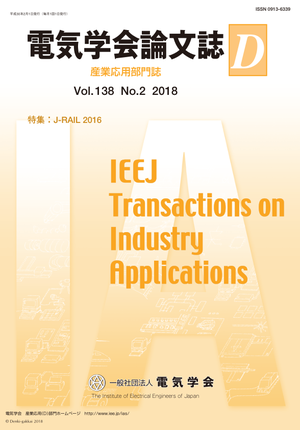n型MOSFETのみを用いたダイオードクランプリニアアンプとクロスオーバー歪み補償法
n型MOSFETのみを用いたダイオードクランプリニアアンプとクロスオーバー歪み補償法
カテゴリ: 論文誌(論文単位)
グループ名: 【D】産業応用部門
発行日: 2018/02/01
タイトル(英語): Diode-Clamped Linear Amplifier using n-channel MOSFET and Crossover Distortion Compensation Method
著者名: 河井 伸哉(長岡技術科学大学 大学院 工学研究科 電気電子情報工学専攻),横倉 勇希(長岡技術科学大学 大学院 工学研究科 電気電子情報工学専攻),大石 潔(長岡技術科学大学 大学院 工学研究科 電気電子情報工学専攻),芳賀 仁(長岡技術科学大学 大学院 工学研究科 電気電子情報工学専攻)
著者名(英語): Shinya Kawai (Department of Electrical, Electronics and Information Engineering, Nagaoka University of Technology), Yuki Yokokura (Department of Electrical, Electronics and Information Engineering, Nagaoka University of Technology), Kiyoshi Ohishi (Depart
キーワード: 線形増幅回路,ダイオードクランプリニアアンプ,クロスオーバー歪み,THD linear amplifier,diode-clamped linear amplifier,crossover distortion,THD
要約(英語): This paper proposes a new diode-clamped linear amplifier (DCLA) topology using only n-channel MOSFETs. Although the conventional DCLA consists of n and p-channel MOSFETs, the proposed DCLA is composed of n-channel MOSFETs. Therefore, the proposed DCLA is easy to develop, because selection of complementary pair MOSFETs is not needed. As with the conventional DCLA, noise level of output voltage of the proposed DCLA is lower than general pulse width modulation (PWM) inverters, because the DCLA uses multilevel topology and active state of MOSFETs. Additionally, this paper also proposes a method of voltage feed-back control, which is capable of compensating crossover distortion of the DCLA. The output voltage of the DCLA has crossover distortion that causes the increase of voltage error and total harmonic distortion (THD). In order to compensate the crossover distortion, a voltage compensator including a plant model for the proposed DCLA is implemented. The proposed method reduces THD of output voltage by 90 percent through the simulations and experimental results.
本誌: 電気学会論文誌D(産業応用部門誌) Vol.138 No.2 (2018) 特集:J-RAIL 2016
本誌掲載ページ: 141-149 p
原稿種別: 論文/日本語
電子版へのリンク: https://www.jstage.jst.go.jp/article/ieejias/138/2/138_141/_article/-char/ja/
受取状況を読み込めませんでした


